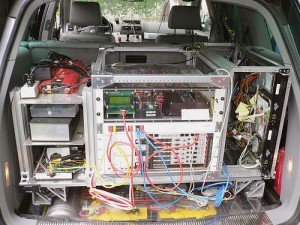 This was really a nice opportunity for me to attend a ‘International Software Testing Conference’. As a ‘Software Tester’ this is really great forum to meet to all great software testing experts and muster knowledge and expertise from them. This is really a huge canvas to expand our network for knowledge concerns. We came across this international event, & finally two of us were selected for the conference.
This was really a nice opportunity for me to attend a ‘International Software Testing Conference’. As a ‘Software Tester’ this is really great forum to meet to all great software testing experts and muster knowledge and expertise from them. This is really a huge canvas to expand our network for knowledge concerns. We came across this international event, & finally two of us were selected for the conference.
We zipped our baggage and flew to Bangalore on 11th May 2011 to attend the conference on 12th and 13th May 2011. On 12th May 2011 we had reached the conference spot with vibrant curiosity which was at ‘Hotel The Chancery Pavilion, Residency Road, Bangalore, INDIA’ for the quest of knowledge.
Attending The Software Testing Conference
We completed the registration process successfully and entered the conference hall. At 9 AM the conference just started with a welcome note. After the welcome note we were given with some highlights of the events for that day.
So this way the conference just started with a huge a surprise. On 12th first event was a KEYNOTE by Rob Lambert, Software Testing Club, UK. “Narrowing the Gap between Requirements and Testing: Feedback Loops, Agile and Communication”. Rob was explaining about the Agile process, and gap between requirements and testing. In normal testing life cycle we follow certain standards about writing testcase and executing the testcases in real time. Which takes a lot of time. But Rob explained that we don’t need
to bother about writing all the test cases where we can make a checklist and only need to check them while testing in agile process. Well some debates were there on this concept but at last we were able to understand to the importance of the process which was explained by Rob. I spoke to Rob about this concept and got some concepts cleared about agile software testing and methodology in real time testing.
The second event was “Define and Build Enterprise Automation Framework”, Speaker(s): JayaKrishnan Sashikumar & Preeth K P, Infosys. In this event they explained their own enterprise automation framework. Which was a requirement in of their projects. They were just explaining the architecture and model of the framework.
“Delivering Business Value through Test Automation” Speaker: Maruthi Sivakumar, AppLabs was the third event. Where MR Marithi Sivakumar was explaining about benefits of Test Automation and how test automation can help manual testers to do their job in better way so that the repetitive task can be done within less human interaction.
After three consecutive events we had a small energy break. And after the energy break the fourth eventjust started.
The fourth event was a KEYNOTE by Julian Harty, eBay, UK. “Pushing the boundaries of User Experience Test Automation”. Julian was explaining about the user experience test automation. Now a days usability is the most important factor for all kinds of application. So Julian was explaining about the ‘User Experience’, and ‘Usability’. How to automate Usability testing while observing the user experience. I had a long discussion with Julian about the ‘User Experience’, ‘Usability’, and ‘User Interface’. In the end I got my doubts clarified by Julian.
The fifth event was “Test Automation Rule Radial Hybrid Framework” Speaker: Velu S. P, IBM. Mr Velu has created his own Framework for test automation for his current project testing. After this there was a lunch break.
The sixth event was “Accelerating Regression Test Automation using Ready-to-use Test Automation Framework” Speaker(s): Chandrashekar S, Pallavi Jain & Vidyadhara C.A, Infosys. In this event the speaker has illustrated how test automation helps in regression testing. The seventh event was “Robust Automation Framework using Database for Test Data” Speaker(s): Sriharirao
Kuchi and Merral Crasto, IBM. In this event the speakers has shown how to use database for data driven testing. Instead of using a flat file or excel sheet for data driven testing they have just explained how database can be used for this purpose and how it is helps as compared to the other file formats which is very very dynamic in nature.
After this we had a small tea break. And after the break we had a Plenary Session by Pradeep Soundararajan, Moolya Software Testing, India “Achieving Personal Excellence as a Tester”. This session was really interesting where Pradeep was explaining what should be the true nature of a software tester. How a ‘Software Tester’ should be in ideal form. How to gain knowledge in Software Testing, and how to communicate with other testers and software testing experts all around the globe. Pradeep has suggested the ideal approach for testing and test management.
“Data Driven Automation Testing of Web Application using Selenium” Speaker(s): Navaraj Javvaji, Anand Sathiyaseelan, UmaMaheswari Selvan, AVA Corp was the eighth session. In this session the speakers were explaining about the selenium tool and how to use it for data driven testing.
So in this way 12th May is over and in the end I had a talk with experts for some real time problems in my early projects.
On 13th May 2011 we have reached the conference spot in the same way. After the registration the conference just started with a welcome note. After the welcome note we are given with some highlights for the events for that day.
The first session was about KEYNOTE by Sai Chintala, Applabs, India “Effective Performance Testing”. In this session Mr Sai from Applabs has explained about the basic concepts of Performance testing and how to do effective performance testing.
“Basics on Security Threats, Challenges and Countermeasures” Speaker: Narsimha Reddy, Infosys was the second session where Mr Narsimha from Infosys has explained core concepts of security threats for any application. Where in this session the discussion was for SQL injection, XSS attacks, Script inject and so on.
In the third session we had “Perform Fuzz on Application’s Web Interface”, Speaker: Aniket Kulkarni, Symantec. Mr Aniket Kulkarni works in Symantec as application security researcher. He was explaining about fuzzing techniques to test any application for security and load testing. How to fuzz any application and crash/break the application and check the logs for the crash. So in this way one can encounter about the security holes in the application. Also Aniket has explained how to capture packets transmitted
and analyze the packets for security threats. Overall this session was really nice and helpful.
“Benefits of Automated Security and Performance Testing of SAP HCM Applications” Speaker(s): Abhinav Gupta, Chandrashekar.S, Shahbaz Ali, Sharita Priya Castelino, Infosys was the fourth session. This session was all about SAP based application.
KEYNOTE by Mahesh Saptarshi, Symantec India, “Software Security – Technical Challenges”. This session was all about software security and negative testing. How can negative testing can lead to software security threat and business risk factors.
The sixth session was on “Performance Testing: A Catalyst for Swift IT” Speaker(s): Ashish Tyagi, Siddharth Joshi, Vivek Bal, Capgemini. Mr Siddharth explained about the performance testing and its implementation in web based application.
“Issues during Performance Testing and Solutions using various Tools and Tricks” Speaker: Amitabh Kaushal, IBM was the seventh session. In this session Mr Amitabh was explaining about the various tools and their usage. Some commercial and open source performance and load testing tools.
All sessions were really informative and useful. However I came across these things which I have learned and which will really add value to my current and future testing work:
• Agile methodology
• Automation testing and creating own automation framework
• User experience Test Automation
• Regression testing using automation testing
• Data driven testing using database, excel sheet, and flat file
• Data Driven Automation Testing of Web Application using Selenium
• Effective performance testing
• Application security threats, challenges, and countermeasures
• Fuzzing technique for web based interface
• Software security testing
• Various tools and tricks for performance testing of application
Likewise attending the sessions I got the prospect to meet, share, and interact with different technology experts from different other companies. We shared our views and work procedure on software testing and methodology we follow. This conference helped me in building my network in the world of Software testing,which will help me getting support and sharing opinions with these experts on different problems from time to time that we face in our day to day work life.
This conference was really a wonderful experience for me. I got to know so many new concepts, tools, techniques, and methodologies which is really going to help me in my work. In fact I have started working in the manner as we have learned from this conference. Well in this international conference I have got the exposure to real time industry experts and their views.
I feel lucky to be a part of Mindfire Solutions, not only for allowing me such a huge opportunity to explore knowledge. This is the beginning of opportunities and there is a long way to go with Mindfire on the path of success. This is really a grand experience for learning matter.
Mindfire is our company which always promotes, enables, and supports in all the initiatives for the career growth of all its employees. I feel good when I get these kind of opportunities. Well this makes me feel special in Mindire. I am also looking forward for the opportunities like this in the future to sharpen my skills and expertise in the Software QA Testing and Quality Assurance.
 From the looks of it, Google‘s latest foray into social web, in the form of +1 button might end up with same fate as its predecessors. In case you are unaware,it is the button at the top with +1 caption which according to Google official blog is digital shorthand for “this is pretty cool” is the search engine giant’s reply to Facebook “Like”. The fact that Google replies with a sentence like “this is pretty cool” to Facebook’s four letter “Like” may give us a rare insight on the mindset prevalent within Google’s team. The 2 character button itself may conform to the Web 2.0 trends,the descriptive sentence makes one wonder if they have embraced Web 2.0 with all their hearts or are just going along with the tide. This would also explain why Google continues to fail in getting a foothold in Social Web. Anyway, I am getting ahead of myself 😛 the pertinent to ask at this point of time is whether +1 is really going to be successful or not.
From the looks of it, Google‘s latest foray into social web, in the form of +1 button might end up with same fate as its predecessors. In case you are unaware,it is the button at the top with +1 caption which according to Google official blog is digital shorthand for “this is pretty cool” is the search engine giant’s reply to Facebook “Like”. The fact that Google replies with a sentence like “this is pretty cool” to Facebook’s four letter “Like” may give us a rare insight on the mindset prevalent within Google’s team. The 2 character button itself may conform to the Web 2.0 trends,the descriptive sentence makes one wonder if they have embraced Web 2.0 with all their hearts or are just going along with the tide. This would also explain why Google continues to fail in getting a foothold in Social Web. Anyway, I am getting ahead of myself 😛 the pertinent to ask at this point of time is whether +1 is really going to be successful or not.








